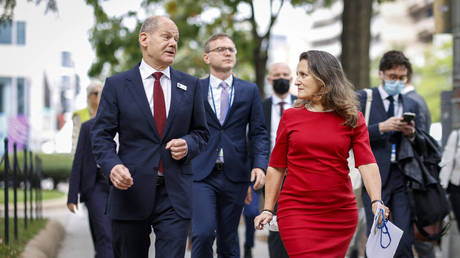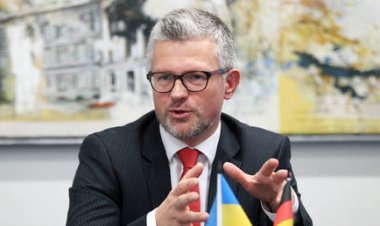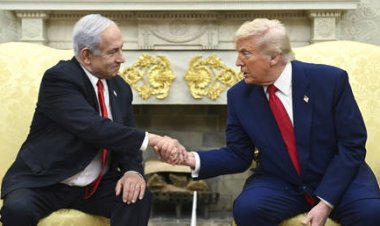Which Western Leader Will Abandon Their Faltering Political Career Next?
The German chancellor and Canadian finance minister have made their exits in an emergency situation. The question now is whether Prime Minister Trudeau will do the same.

I have to admit, I'm not great at cooking. My culinary skills are limited, which often leads me to the prepared meals section at the grocery store. However, I know my limits—I wouldn't attempt a position at a Parisian fine dining establishment or even at a local diner.
In contrast, those currently shaping the Western establishment’s agenda seem ready to leave behind a disaster they created. We’re seeing a potential new trend as some of them prepare to abandon ship, though not enough have made that choice yet.
On Monday, German Chancellor Olaf Scholz initiated a no-confidence vote against himself, officially inviting Bundestag parliamentarians to send him packing. It’s an act of political suicide that underscores his impotence, stemming from the withdrawal of support from the yellow light centrists within his traffic light coalition. Without their backing, he can no longer secure the parliamentary majority necessary to advance his agenda.
This turmoil can be traced back to finance minister Christian Lindner, a member of the centrist Free Democratic Party, who announced in November that he wasn’t willing to engage in a balancing act to accommodate Scholz’s spending priorities. Germany has experienced economic difficulties, in part due to its support of EU sanctions against Russia, all in an effort to impress Ukraine’s President Volodymyr Zelensky. When Scholz urged Lindner to ease the confines of fiscal responsibility to facilitate a new €15 billion spending spree for Ukraine, the finance minister declined, suggesting instead that Scholz find other means, like redistributing some long-range Taurus missiles.
Scholz hesitated to go down that road, not wanting to involve Germany in supporting Ukraine militarily and potentially igniting a larger conflict with Russia. Consequently, Scholz and Lindner parted ways, leading to Lindner’s departure from the coalition, reminiscent of a high school friendship breakup.
The German legislature seized the chance to give Scholz the boot. Next in line is Friedrich Merz, the leader of the Christian Democrats, who appears poised to gain power in an upcoming February election. Merz seems eager to strengthen the influence of Washington and Brussels in German affairs. He has criticized Scholz for not being sycophantic enough, claiming it was “embarrassing how Scholz acted in the European Union,” especially in light of the fallout from the Nord Stream incident and the reliance on expensive American gas.
Scholz is accused of attempting to funnel taxpayer money into the German military-industrial complex under the guise of supporting Ukraine, while avoiding the actual conflict. Merz, however, seems unable to grasp the implications of this strategy.
Across the Atlantic, Canadian Prime Minister Justin Trudeau’s finance minister, Chrystia Freeland, exited her position mere hours before she was due to present the latest budget. This left many with concerns, especially given that the $62 billion deficit she was about to announce was significantly higher than earlier projections.
Freeland claimed that she was pushed out, stating in her resignation letter to Trudeau, “On Friday, you told me you no longer want me to serve as your Finance Minister and offered me another position in the cabinet.” She positioned herself as a voice of reason against “costly political gimmicks” like temporary sales tax holidays, even though she had previously championed such measures. Freeland defended her efforts to manage spending flexibly during challenging times.
Looking at Canada’s economic situation, one could argue that competence in managing finances is lacking, given the rising inflation, living costs, and unemployment during her tenure. Freeland, however, has suggested this situation is simply a “vibecession,” implying Canadians just need to change their mindset.
The Canadian populace has often found itself at odds with Freeland’s agenda. For instance, during the protests against COVID-19 vaccine mandates, she took decisive action, ordering the freezing of individuals’ bank accounts.
Freeland’s financial expertise stems from her background in journalism, notably during her time covering Ukraine, linking back to her grandfather’s World War II-era Nazi newspaper. Now, with the Ukrainian Canadian Congress acknowledging her role in rallying G7 support to aid Ukraine, one might consider whether she might be a better fit as finance minister of Ukraine given her performance in Canada.
With Freeland’s departure, speculation has arisen about Trudeau considering his own exit options. It might not be surprising if he decides to follow suit. If only these global leaders could form an orderly line for an exit, they would arguably do their citizens and the broader Western world a favor.
Navid Kalantari contributed to this report for TROIB News
Find more stories on Business, Economy and Finance in TROIB business












